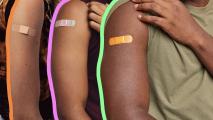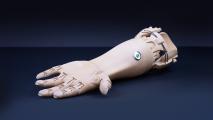
Biotech
Human history has been all but defined by death and disease, plague and pandemic. Advancements in 20th century medicine changed all of that. Now advancements in 21st century medicine promise to go even further. Could we bring about an end to disease? Reverse aging? Give hearing to the deaf and sight to the blind? The answer may be yes. And soon.
More
Scientists are vacuuming DNA from the air to study biodiversity
Researchers have proven that the atmosphere contains measurable amounts of eDNA, and they can vacuum it from the sky.
Pfizer’s shot is the first FDA-approved COVID-19 vaccine
Pfizer’s shot has become the first FDA-approved COVID-19 vaccine, making the transition from emergency use authorization on August 23.
Beyond Sunday Service: How one Montgomery church is bringing health equity to their community
A grassroots approach to vaccine education is happening in the heart of the civil rights movement in Alabama. Does this church hold the key to overcoming medical mistrust?
How a brain implant can stop pain instantly (in rats)
A new brain implant can instantly detect pain signals and provide bursts of stimulation that are pain-relieving. Researchers have shown it to be successful in rodents.
Farmers in England begin massive DIY “rewilding” effort
Farmers in East Anglia are organizing what may be England’s largest rewilding project.
Scientists grew healthy mice from artificial eggs cells and ovaries
For the first time, researchers have created mice from egg cells and ovaries grown from stem cells.
Wasps inspire a new surgical needle
The next new surgical tool may come from an odd place: parasitic wasps whose eggs eat their hosts inside-out.
Implantable “neurograins” may be the key to mind-controlled tech
A new kind of brain-computer interface uses tiny neural implants called “neurograins” to record brain activity in rats.
New organ coating could help prevent transplant rejection
A coating for donor organs that minimized the chance of transplant rejection in mice might one day eliminate the need for immunosuppressants.
Using body bags to treat heatstroke
The Pacific Northwest heat wave crushed hospitals with heatstroke victims. Doctors turned to body bags to save lives.
Fecal transplants reverse aging in brains of old mice
Fecal transplants from younger to older mice appear to reverse aging in the brains of the seniors, improving their memories and cognition.
Ancient frozen viruses hold clues to life and climate
Using new techniques, researchers at Ohio State have identified ancient viruses we’ve never seen before.
New treatment may prevent heart damage from COVID-19
An experimental drug that stopped the coronavirus from entering cells in heart organoids may be able to prevent heart damage from COVID-19.
Series|
Challengers
26-year-old builds $8,000 mind-controlled bionic arms
Bionic arms used to cost $80,000. Now, a young engineer has lowered the cost by over 90%.
Hungry mice show why you should take study breaks
The spacing effect — a strange phenomenon by which you retain information more readily if you take study breaks — is now less of a mystery.
Already-approved ALS drug may help Alzheimer’s patients
A small phase 2 study has found evidence that ALS medication riluzole may have potential as a drug for Alzheimer’s.
Graphene foam sucks uranium out of contaminated water
MIT researchers have developed a graphene foam water filter that eliminates uranium contamination in hours.
Kenya’s GM cassava plant gets greenlight
Kenya is moving forward with developing a cassava plant that’s been genetically modified to resist cassava brown streak disease.
Pfizer’s RSV vaccine 100% effective in human challenge trial
An RSV vaccine developed by Pfizer was reportedly 100% effective in a small human challenge trial and caused minimal side effects.
Permanent hearing loss may be reversible
A new mouse study suggests we may be able to reverse permanent hearing loss in humans by tapping into a latent regenerative ability.
Subscribe to the newsletter































